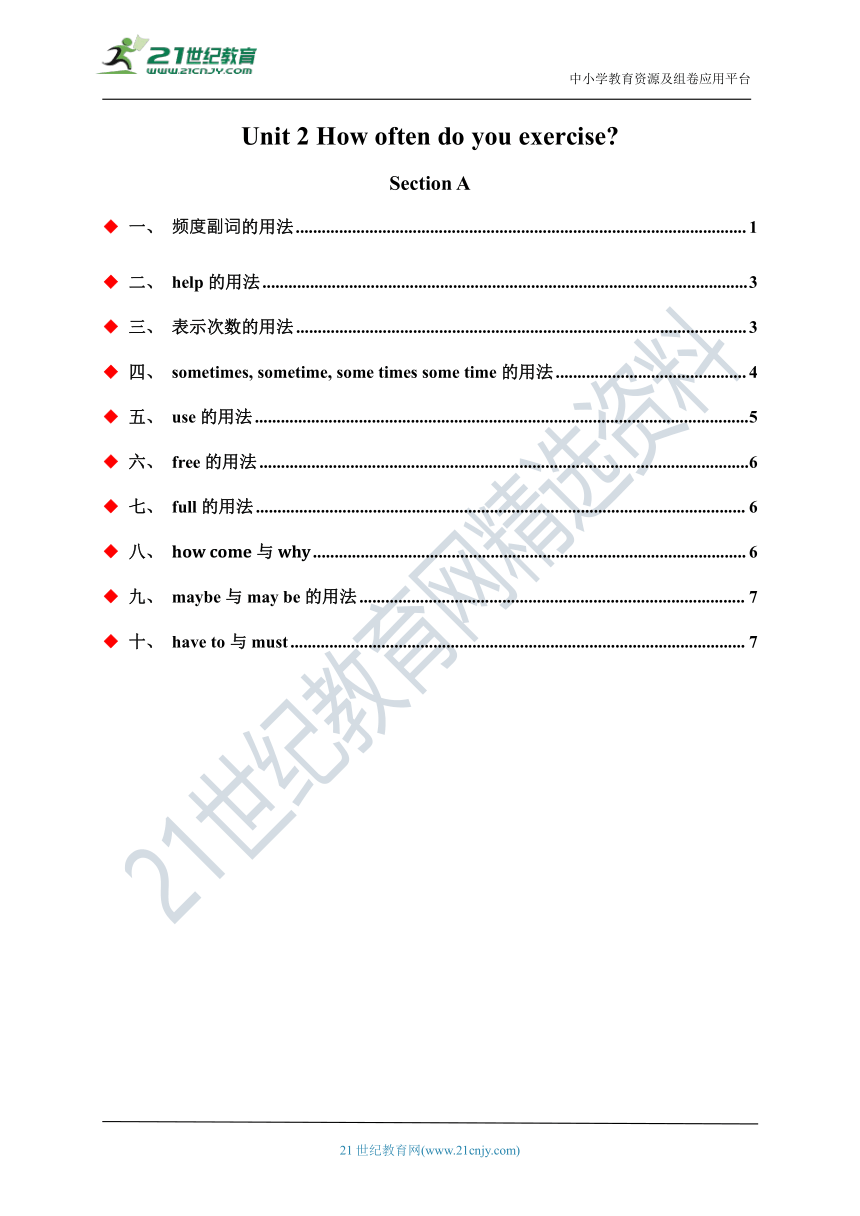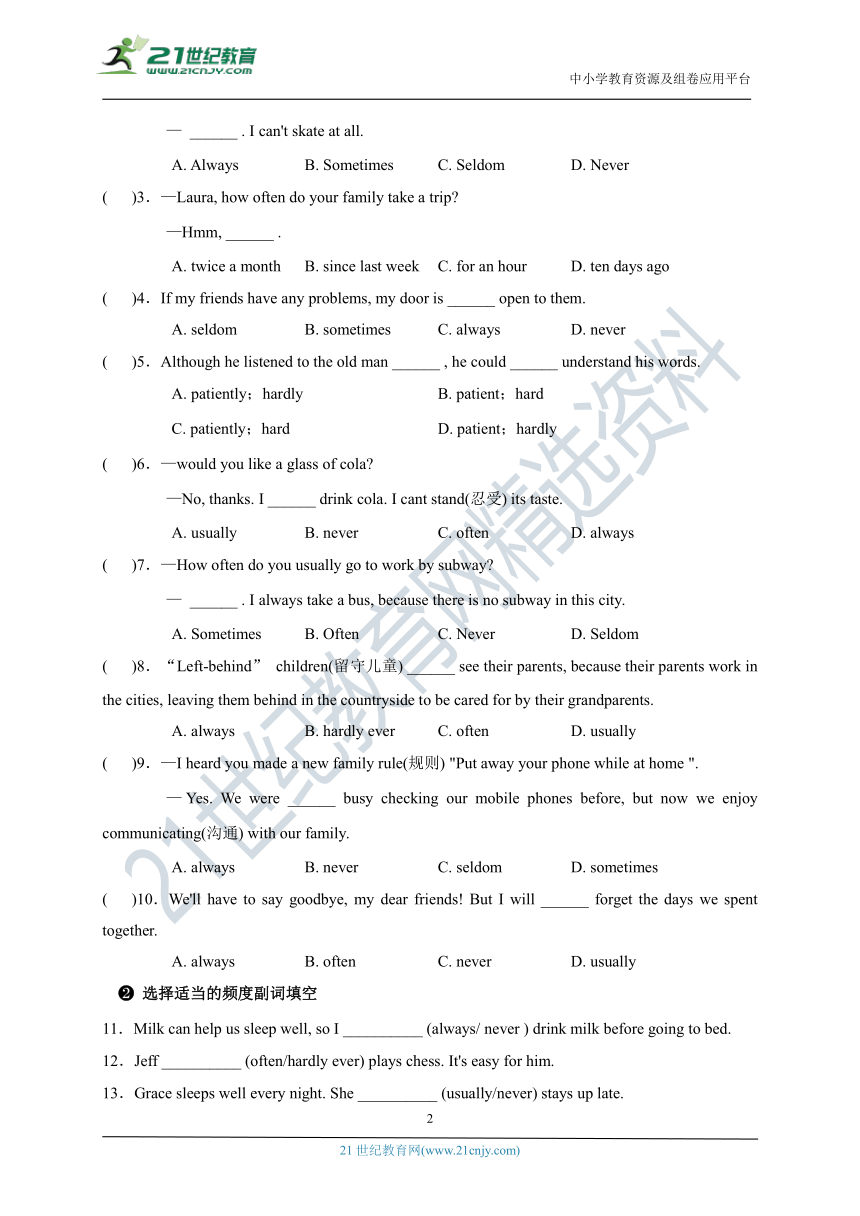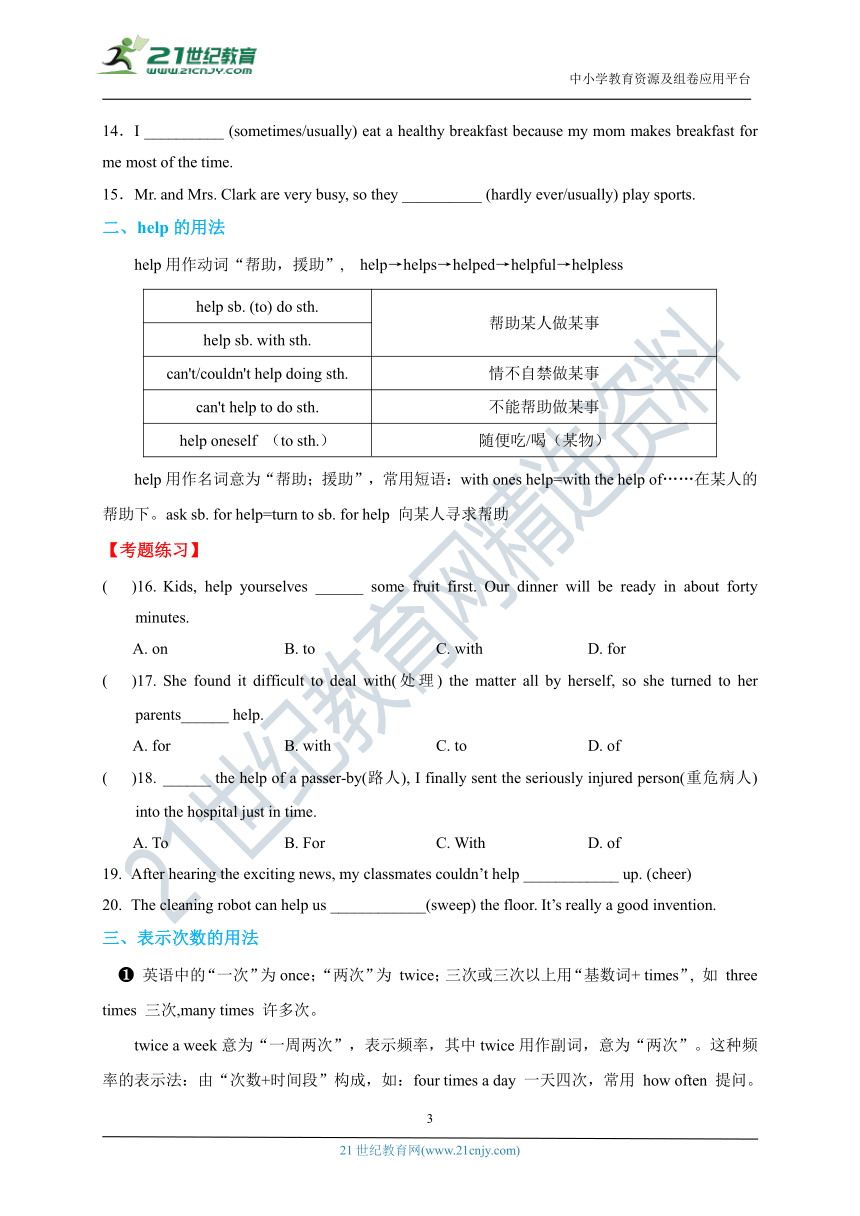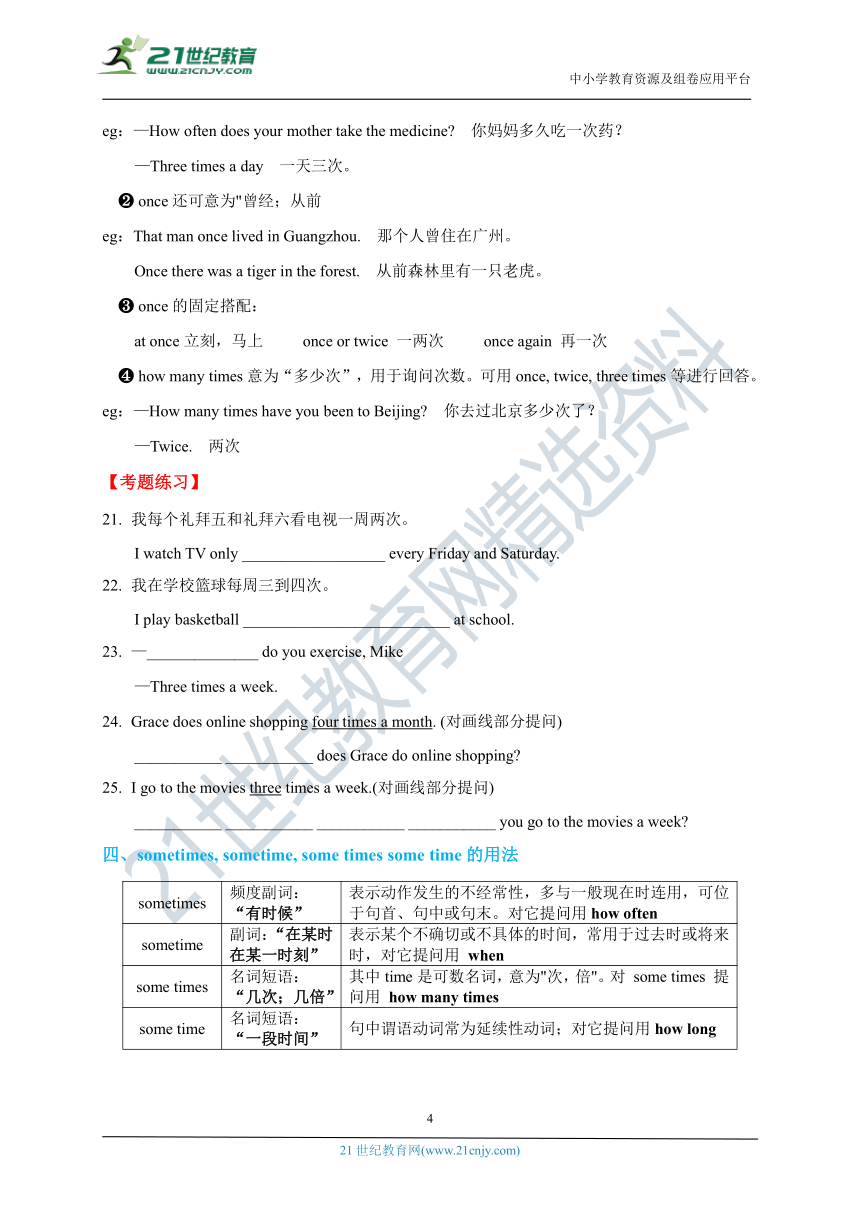Unit 2 How often do you exercise Section A 重要知识考点+练习过关 (含答案)
文档属性
| 名称 | Unit 2 How often do you exercise Section A 重要知识考点+练习过关 (含答案) |  | |
| 格式 | docx | ||
| 文件大小 | 1.1MB | ||
| 资源类型 | 试卷 | ||
| 版本资源 | 人教新目标(Go for it)版 | ||
| 科目 | 英语 | ||
| 更新时间 | 2021-09-13 15:12:03 | ||
图片预览





文档简介
Unit
2
How
often
do
you
exercise?
Section
A
一、
频度副词的用法
1
二、
help的用法
3
三、
表示次数的用法
3
四、
sometimes,
sometime,
some
times
some
time的用法
4
五、
use的用法
5
六、
free的用法
6
七、
full的用法
6
八、
how
come与why
6
九、
maybe与may
be的用法
7
十、
have
to与must
7
中小学教育资源及组卷应用平台
21世纪教育网
www.21cnjy.com
精品试卷·第
2
页
(共
2
页)
21世纪教育网(www.21cnjy.com)
Unit
2
How
often
do
you
exercise?
Section
A
频度副词的用法
?
频度副词的含义:表示次数、频率的副词称为频度副词。常用的频度副词按频率的高低依次为:always﹥usually﹥often﹥sometimes﹥seldom﹥hardly
ever﹥never
eg:John
always
comes
late.
约翰总是迟到。
He
hardly
ever
exercises.
他几乎从不锻炼。
?
表示具体的频率、次数时,一次用once,两次用twice,三次及以上用“基数词+
times”表示。
eg:I
exercise
once
a
week.我一周锻炼一次。
I
visit
my
grandmother
four
times
a
year.
我一年去看望我(外)祖母四次。
?
频度副词的位置
频度副词一般位于情态动词、助动词、连系动词之后,实义动词之前。
eg:He
can
never
understand.
他永远也不会明白。(在情态动词之后)
She
is
sometimes
very
busy.
她有时很忙。(在be动词之后)
He
sometimes
goes
there
on
business.
他有时到那里出差。(在实义动词之前)
?
频度副词常与一般现在时连用,表示现在经常或反复发生的动作。
eg:He
often
goes
to
school
by
bike.
他经常骑自行车去上学。
?
对这些频度副词提问时,用how
often
eg:How
often
do
you
write
to
your
elder
brother?
你多久给你哥哥写一封信?
【考题练习】
?
选择题
I
______
ride
a
bike
to
school.
But
this
morning,
I
walked
to
school.
A.
never
B.
hardly
C.
seldom
D.
usually
—How
often
do
you
go
skating?
—
______
.
I
can't
skate
at
all.
A.
Always
B.
Sometimes
C.
Seldom
D.
Never
—Laura,
how
often
do
your
family
take
a
trip?
—Hmm,
______
.
A.
twice
a
month
B.
since
last
week
C.
for
an
hour
D.
ten
days
ago
If
my
friends
have
any
problems,
my
door
is
______
open
to
them.
A.
seldom
B.
sometimes
C.
always
D.
never
Although
he
listened
to
the
old
man
______
,
he
could
______
understand
his
words.
A.
patiently;hardly
B.
patient;hard
C.
patiently;hard
D.
patient;hardly
—would
you
like
a
glass
of
cola?
—No,
thanks.
I
______
drink
cola.
I
cant
stand(忍受)
its
taste.
A.
usually
B.
never
C.
often
D.
always
—How
often
do
you
usually
go
to
work
by
subway?
—
______
.
I
always
take
a
bus,
because
there
is
no
subway
in
this
city.
A.
Sometimes
B.
Often
C.
Never
D.
Seldom
“Left-behind”
children(留守儿童)
______
see
their
parents,
because
their
parents
work
in
the
cities,
leaving
them
behind
in
the
countryside
to
be
cared
for
by
their
grandparents.
A.
always
B.
hardly
ever
C.
often
D.
usually
—I
heard
you
made
a
new
family
rule(规则)
"Put
away
your
phone
while
at
home
".
—Yes.
We
were
______
busy
checking
our
mobile
phones
before,
but
now
we
enjoy
communicating(沟通)
with
our
family.
A.
always
B.
never
C.
seldom
D.
sometimes
We'll
have
to
say
goodbye,
my
dear
friends!
But
I
will
______
forget
the
days
we
spent
together.
A.
always
B.
often
C.
never
D.
usually
?
选择适当的频度副词填空
Milk
can
help
us
sleep
well,
so
I
__________
(always/
never
)
drink
milk
before
going
to
bed.
Jeff
__________
(often/hardly
ever)
plays
chess.
It's
easy
for
him.
Grace
sleeps
well
every
night.
She
__________
(usually/never)
stays
up
late.
I
__________
(sometimes/usually)
eat
a
healthy
breakfast
because
my
mom
makes
breakfast
for
me
most
of
the
time.
Mr.
and
Mrs.
Clark
are
very
busy,
so
they
__________
(hardly
ever/usually)
play
sports.
help的用法
help用作动词“帮助,援助”,
help→helps→helped→helpful→helpless
help
sb.
(to)
do
sth.
帮助某人做某事
help
sb.
with
sth.
can't/couldn't
help
doing
sth.
情不自禁做某事
can't
help
to
do
sth.
不能帮助做某事
help
oneself
(to
sth.)
随便吃/喝(某物)
help用作名词意为“帮助;援助”,常用短语:with
ones
help=with
the
help
of……在某人的帮助下。ask
sb.
for
help=turn
to
sb.
for
help
向某人寻求帮助
【考题练习】
Kids,
help
yourselves
______
some
fruit
first.
Our
dinner
will
be
ready
in
about
forty
minutes.
A.
on
B.
to
C.
with
D.
for
She
found
it
difficult
to
deal
with(处理)
the
matter
all
by
herself,
so
she
turned
to
her
parents______
help.
A.
for
B.
with
C.
to
D.
of
______
the
help
of
a
passer-by(路人),
I
finally
sent
the
seriously
injured
person(重危病人)
into
the
hospital
just
in
time.
A.
To
B.
For
C.
With
D.
of
After
hearing
the
exciting
news,
my
classmates
couldn’t
help
____________
up.
(cheer)
The
cleaning
robot
can
help
us
____________(sweep)
the
floor.
It’s
really
a
good
invention.
表示次数的用法
?
英语中的“一次”为once;“两次”为
twice;三次或三次以上用“基数词+
times”,
如
three
times
三次,many
times
许多次。
twice
a
week意为“一周两次”,表示频率,其中twice用作副词,意为“两次”。这种频率的表示法:由“次数+时间段”构成,如:four
times
a
day
一天四次,常用
how
often
提问。
eg:—How
often
does
your
mother
take
the
medicine?
你妈妈多久吃一次药?
—Three
times
a
day
一天三次。
?
once还可意为"曾经;从前
eg:That
man
once
lived
in
Guangzhou.
那个人曾住在广州。
Once
there
was
a
tiger
in
the
forest.
从前森林里有一只老虎。
?
once的固定搭配:
at
once立刻,马上
once
or
twice
一两次
once
again
再一次
?
how
many
times意为“多少次”,用于询问次数。可用once,
twice,
three
times等进行回答。
eg:—How
many
times
have
you
been
to
Beijing?
你去过北京多少次了?
—Twice.
两次
【考题练习】
我每个礼拜五和礼拜六看电视一周两次。
I
watch
TV
only
__________________
every
Friday
and
Saturday.
我在学校篮球每周三到四次。
I
play
basketball
__________________________
at
school.
—______________
do
you
exercise,
Mike
—Three
times
a
week.
Grace
does
online
shopping
four
times
a
month.
(对画线部分提问)
___________
___________
does
Grace
do
online
shopping?
I
go
to
the
movies
three
times
a
week.(对画线部分提问)
___________
___________
___________
___________
you
go
to
the
movies
a
week?
sometimes,
sometime,
some
times
some
time的用法
sometimes
频度副词:
“有时候”
表示动作发生的不经常性,多与一般现在时连用,可位于句首、句中或句末。对它提问用how
often
sometime
副词:“在某时
在某一时刻”
表示某个不确切或不具体的时间,常用于过去时或将来时,对它提问用
when
some
times
名词短语:
“几次;几倍”
其中time是可数名词,意为"次,倍"。对
some
times
提问用
how
many
times
some
time
名词短语:
“一段时间”
句中谓语动词常为延续性动词;对它提问用how
long
【考题练习】
I
will
visit
England
____________
next
summer.
A.
sometimes.
B.
some
times
C.
some
time
D.
sometime
____________
I
go
to
school
on
foot.
A.
Some
times
B.
Some
time
C.
Sometime
D.
Sometimes
____________
my
sister
goes
to
school
by
bus.
A.
Sometime
B.
Sometimes
C.
Some
time
D.
Some
times
He
said
he
would
come
to
see
us
____________
the
next
month.
A.
sometime
B.
some
time
C.
sometimes
D.
Some
times
I
will
be
away
for
____________.
A.
sometime
B.
sometimes
C.
some
time
D.
some
times
use的用法
used
to
do
sth.
过去常常做某事
表示过去经常发生的动作或存在的状态,而现在已不再发生或存在。其否定形式常用used
not
to或didn't
use
to。反意疑问句中应该用did/didn't或used/usedn't。
be
used
to
do
sth.
be
used
for
doing
sth.
被用来做某事
use表"使用"之意,是被动语态形式,to是动词不定式符号。for是介词短语。
be/get/become
used
to
doing
sth.
be
used
to
sth.
习惯于做某事
表示习惯于某一客观事实或状态,其中to是介词,后面跟名词、代词或动名词。be
used可用于多种时态;如强调动作可用get或become替换be。
use
sth.
to
do
sth.
用某物做某事
表示使用东西做什么事。
be
used
as
sth.
被用来当做某物
表示被用来当做某物。
【考题练习】
我过去常常放学后踢足球。
I
________________________
football
after
school.
我过去常常在每天晚上饭后去散步
I
________________________
a
walk
after
supper
every
night.
老年人习惯早晨很早起床。
Old
people
________________________
up
early
in
the
morning.
树木可以用来造纸。
Wood
can
________________________
paper./Wood
can
________________________
paper.
我用钢笔写字
I
____________
the
pen
____________.
英语在中国被当作外语。
English
________________________
a
foreign
language
in
China.
free的用法
free
形容词
“空闲的,有空的”
be
free
有空的,反义词是busy。
形容词
“免费的,自由的”
be
free
to
do
sth
自由的做某事。
【考题练习】
我明天有空。
I'll
________________________
tomorrow.
我有三张今晚的免费电影票。
I've
got
three
________________________
or
tonight’s
film.
这是个自由的国家。
This
is
a
________________________.
full的用法
full
形容词
“忙的”
形容词
“满的、充满的”常用短语为be
full
of,相当于be
filled
with,意为“充满……”。
形容词
“饱的”其反义词是hungry,意为“饥饿的”。
【考题练习】
他太忙了,以至于没有培养业余爱好的时间。
He
was
_________________
to
have
time
for
hobbies.
房间里挤满了人
The
room
_________________
people/The
room
_________________
people.
我不能再吃了,我相当饱了。
I
can't
eat
any
more.
I
am
_________________.
how
come与why
how
come
意思相近,都可表示“为什么”
可以独立使用,也可引导的句子,语序为陈述语序
why
引导的特殊疑问句的语序为疑问语序
【考题练习】
你为什么不喜欢吃三明治?
_________________you
don't
like
eating
sandwiches?
你为什么不喜欢吃三明治?
_________________
don't
you
like
eating
sandwiches?
maybe与may
be的用法
maybe
副词,作状语,意为"或许;大概;能",常位于句首
may
be
属于"情态动词+动词原形"结构,作谓语,意为"可能是;也许是”
【考题练习】
我大概一个月去看一次电影。
I
go
to
the
movies
___________
once
a
month.
我找不到我的手表了,它可能在你的口袋。
I
can't
find
my
watch.
It
___________
in
your
pocket.
have
to与must
have
to
意为“必须;不得不”,表示客观的需要,有人称、数、时态的变化。don’t/doesn't
have
to意为“不必”。
must
意为“必须”,表示说话人主观上的看法,只有一种形式。mustn’t意为“禁止”。
【考题练习】
你没必要把这件事告诉他。
You
__________________________
him
about
it.
你不准把这件事告诉他。
You
__________________________
him
about
it.
昨天她不得不步行去那儿。
She
___________________
go
there
on
foot
yesterday.
他说她必须同我一起去
He
said
(that)
she
_____________
go
with
me.
参
考
答
案
D
D
A
C
A
B
C
B
A
C
always
often
never
usually
hardly
ever
B
A
C
cheering
(to)
sweep
twice
a
week
three
to
four
times
a
week
How
often
How
often
How
many
times
do
D
D
B
A
C
used
to
play
used
to
take
are/get/become
used
to
getting
be
used
to
make/be
used
for
making
use;
to
write
is
used
as
be
free
free
tickets
free
country
too
full
is
full
of/is
filled
with
quite
full
How
come
Why
maybe
may
be
don’t
have
to
tell
mustn’t
tell
had
to
must
21世纪教育网(www.21cnjy.com)
2
How
often
do
you
exercise?
Section
A
一、
频度副词的用法
1
二、
help的用法
3
三、
表示次数的用法
3
四、
sometimes,
sometime,
some
times
some
time的用法
4
五、
use的用法
5
六、
free的用法
6
七、
full的用法
6
八、
how
come与why
6
九、
maybe与may
be的用法
7
十、
have
to与must
7
中小学教育资源及组卷应用平台
21世纪教育网
www.21cnjy.com
精品试卷·第
2
页
(共
2
页)
21世纪教育网(www.21cnjy.com)
Unit
2
How
often
do
you
exercise?
Section
A
频度副词的用法
?
频度副词的含义:表示次数、频率的副词称为频度副词。常用的频度副词按频率的高低依次为:always﹥usually﹥often﹥sometimes﹥seldom﹥hardly
ever﹥never
eg:John
always
comes
late.
约翰总是迟到。
He
hardly
ever
exercises.
他几乎从不锻炼。
?
表示具体的频率、次数时,一次用once,两次用twice,三次及以上用“基数词+
times”表示。
eg:I
exercise
once
a
week.我一周锻炼一次。
I
visit
my
grandmother
four
times
a
year.
我一年去看望我(外)祖母四次。
?
频度副词的位置
频度副词一般位于情态动词、助动词、连系动词之后,实义动词之前。
eg:He
can
never
understand.
他永远也不会明白。(在情态动词之后)
She
is
sometimes
very
busy.
她有时很忙。(在be动词之后)
He
sometimes
goes
there
on
business.
他有时到那里出差。(在实义动词之前)
?
频度副词常与一般现在时连用,表示现在经常或反复发生的动作。
eg:He
often
goes
to
school
by
bike.
他经常骑自行车去上学。
?
对这些频度副词提问时,用how
often
eg:How
often
do
you
write
to
your
elder
brother?
你多久给你哥哥写一封信?
【考题练习】
?
选择题
I
______
ride
a
bike
to
school.
But
this
morning,
I
walked
to
school.
A.
never
B.
hardly
C.
seldom
D.
usually
—How
often
do
you
go
skating?
—
______
.
I
can't
skate
at
all.
A.
Always
B.
Sometimes
C.
Seldom
D.
Never
—Laura,
how
often
do
your
family
take
a
trip?
—Hmm,
______
.
A.
twice
a
month
B.
since
last
week
C.
for
an
hour
D.
ten
days
ago
If
my
friends
have
any
problems,
my
door
is
______
open
to
them.
A.
seldom
B.
sometimes
C.
always
D.
never
Although
he
listened
to
the
old
man
______
,
he
could
______
understand
his
words.
A.
patiently;hardly
B.
patient;hard
C.
patiently;hard
D.
patient;hardly
—would
you
like
a
glass
of
cola?
—No,
thanks.
I
______
drink
cola.
I
cant
stand(忍受)
its
taste.
A.
usually
B.
never
C.
often
D.
always
—How
often
do
you
usually
go
to
work
by
subway?
—
______
.
I
always
take
a
bus,
because
there
is
no
subway
in
this
city.
A.
Sometimes
B.
Often
C.
Never
D.
Seldom
“Left-behind”
children(留守儿童)
______
see
their
parents,
because
their
parents
work
in
the
cities,
leaving
them
behind
in
the
countryside
to
be
cared
for
by
their
grandparents.
A.
always
B.
hardly
ever
C.
often
D.
usually
—I
heard
you
made
a
new
family
rule(规则)
"Put
away
your
phone
while
at
home
".
—Yes.
We
were
______
busy
checking
our
mobile
phones
before,
but
now
we
enjoy
communicating(沟通)
with
our
family.
A.
always
B.
never
C.
seldom
D.
sometimes
We'll
have
to
say
goodbye,
my
dear
friends!
But
I
will
______
forget
the
days
we
spent
together.
A.
always
B.
often
C.
never
D.
usually
?
选择适当的频度副词填空
Milk
can
help
us
sleep
well,
so
I
__________
(always/
never
)
drink
milk
before
going
to
bed.
Jeff
__________
(often/hardly
ever)
plays
chess.
It's
easy
for
him.
Grace
sleeps
well
every
night.
She
__________
(usually/never)
stays
up
late.
I
__________
(sometimes/usually)
eat
a
healthy
breakfast
because
my
mom
makes
breakfast
for
me
most
of
the
time.
Mr.
and
Mrs.
Clark
are
very
busy,
so
they
__________
(hardly
ever/usually)
play
sports.
help的用法
help用作动词“帮助,援助”,
help→helps→helped→helpful→helpless
help
sb.
(to)
do
sth.
帮助某人做某事
help
sb.
with
sth.
can't/couldn't
help
doing
sth.
情不自禁做某事
can't
help
to
do
sth.
不能帮助做某事
help
oneself
(to
sth.)
随便吃/喝(某物)
help用作名词意为“帮助;援助”,常用短语:with
ones
help=with
the
help
of……在某人的帮助下。ask
sb.
for
help=turn
to
sb.
for
help
向某人寻求帮助
【考题练习】
Kids,
help
yourselves
______
some
fruit
first.
Our
dinner
will
be
ready
in
about
forty
minutes.
A.
on
B.
to
C.
with
D.
for
She
found
it
difficult
to
deal
with(处理)
the
matter
all
by
herself,
so
she
turned
to
her
parents______
help.
A.
for
B.
with
C.
to
D.
of
______
the
help
of
a
passer-by(路人),
I
finally
sent
the
seriously
injured
person(重危病人)
into
the
hospital
just
in
time.
A.
To
B.
For
C.
With
D.
of
After
hearing
the
exciting
news,
my
classmates
couldn’t
help
____________
up.
(cheer)
The
cleaning
robot
can
help
us
____________(sweep)
the
floor.
It’s
really
a
good
invention.
表示次数的用法
?
英语中的“一次”为once;“两次”为
twice;三次或三次以上用“基数词+
times”,
如
three
times
三次,many
times
许多次。
twice
a
week意为“一周两次”,表示频率,其中twice用作副词,意为“两次”。这种频率的表示法:由“次数+时间段”构成,如:four
times
a
day
一天四次,常用
how
often
提问。
eg:—How
often
does
your
mother
take
the
medicine?
你妈妈多久吃一次药?
—Three
times
a
day
一天三次。
?
once还可意为"曾经;从前
eg:That
man
once
lived
in
Guangzhou.
那个人曾住在广州。
Once
there
was
a
tiger
in
the
forest.
从前森林里有一只老虎。
?
once的固定搭配:
at
once立刻,马上
once
or
twice
一两次
once
again
再一次
?
how
many
times意为“多少次”,用于询问次数。可用once,
twice,
three
times等进行回答。
eg:—How
many
times
have
you
been
to
Beijing?
你去过北京多少次了?
—Twice.
两次
【考题练习】
我每个礼拜五和礼拜六看电视一周两次。
I
watch
TV
only
__________________
every
Friday
and
Saturday.
我在学校篮球每周三到四次。
I
play
basketball
__________________________
at
school.
—______________
do
you
exercise,
Mike
—Three
times
a
week.
Grace
does
online
shopping
four
times
a
month.
(对画线部分提问)
___________
___________
does
Grace
do
online
shopping?
I
go
to
the
movies
three
times
a
week.(对画线部分提问)
___________
___________
___________
___________
you
go
to
the
movies
a
week?
sometimes,
sometime,
some
times
some
time的用法
sometimes
频度副词:
“有时候”
表示动作发生的不经常性,多与一般现在时连用,可位于句首、句中或句末。对它提问用how
often
sometime
副词:“在某时
在某一时刻”
表示某个不确切或不具体的时间,常用于过去时或将来时,对它提问用
when
some
times
名词短语:
“几次;几倍”
其中time是可数名词,意为"次,倍"。对
some
times
提问用
how
many
times
some
time
名词短语:
“一段时间”
句中谓语动词常为延续性动词;对它提问用how
long
【考题练习】
I
will
visit
England
____________
next
summer.
A.
sometimes.
B.
some
times
C.
some
time
D.
sometime
____________
I
go
to
school
on
foot.
A.
Some
times
B.
Some
time
C.
Sometime
D.
Sometimes
____________
my
sister
goes
to
school
by
bus.
A.
Sometime
B.
Sometimes
C.
Some
time
D.
Some
times
He
said
he
would
come
to
see
us
____________
the
next
month.
A.
sometime
B.
some
time
C.
sometimes
D.
Some
times
I
will
be
away
for
____________.
A.
sometime
B.
sometimes
C.
some
time
D.
some
times
use的用法
used
to
do
sth.
过去常常做某事
表示过去经常发生的动作或存在的状态,而现在已不再发生或存在。其否定形式常用used
not
to或didn't
use
to。反意疑问句中应该用did/didn't或used/usedn't。
be
used
to
do
sth.
be
used
for
doing
sth.
被用来做某事
use表"使用"之意,是被动语态形式,to是动词不定式符号。for是介词短语。
be/get/become
used
to
doing
sth.
be
used
to
sth.
习惯于做某事
表示习惯于某一客观事实或状态,其中to是介词,后面跟名词、代词或动名词。be
used可用于多种时态;如强调动作可用get或become替换be。
use
sth.
to
do
sth.
用某物做某事
表示使用东西做什么事。
be
used
as
sth.
被用来当做某物
表示被用来当做某物。
【考题练习】
我过去常常放学后踢足球。
I
________________________
football
after
school.
我过去常常在每天晚上饭后去散步
I
________________________
a
walk
after
supper
every
night.
老年人习惯早晨很早起床。
Old
people
________________________
up
early
in
the
morning.
树木可以用来造纸。
Wood
can
________________________
paper./Wood
can
________________________
paper.
我用钢笔写字
I
____________
the
pen
____________.
英语在中国被当作外语。
English
________________________
a
foreign
language
in
China.
free的用法
free
形容词
“空闲的,有空的”
be
free
有空的,反义词是busy。
形容词
“免费的,自由的”
be
free
to
do
sth
自由的做某事。
【考题练习】
我明天有空。
I'll
________________________
tomorrow.
我有三张今晚的免费电影票。
I've
got
three
________________________
or
tonight’s
film.
这是个自由的国家。
This
is
a
________________________.
full的用法
full
形容词
“忙的”
形容词
“满的、充满的”常用短语为be
full
of,相当于be
filled
with,意为“充满……”。
形容词
“饱的”其反义词是hungry,意为“饥饿的”。
【考题练习】
他太忙了,以至于没有培养业余爱好的时间。
He
was
_________________
to
have
time
for
hobbies.
房间里挤满了人
The
room
_________________
people/The
room
_________________
people.
我不能再吃了,我相当饱了。
I
can't
eat
any
more.
I
am
_________________.
how
come与why
how
come
意思相近,都可表示“为什么”
可以独立使用,也可引导的句子,语序为陈述语序
why
引导的特殊疑问句的语序为疑问语序
【考题练习】
你为什么不喜欢吃三明治?
_________________you
don't
like
eating
sandwiches?
你为什么不喜欢吃三明治?
_________________
don't
you
like
eating
sandwiches?
maybe与may
be的用法
maybe
副词,作状语,意为"或许;大概;能",常位于句首
may
be
属于"情态动词+动词原形"结构,作谓语,意为"可能是;也许是”
【考题练习】
我大概一个月去看一次电影。
I
go
to
the
movies
___________
once
a
month.
我找不到我的手表了,它可能在你的口袋。
I
can't
find
my
watch.
It
___________
in
your
pocket.
have
to与must
have
to
意为“必须;不得不”,表示客观的需要,有人称、数、时态的变化。don’t/doesn't
have
to意为“不必”。
must
意为“必须”,表示说话人主观上的看法,只有一种形式。mustn’t意为“禁止”。
【考题练习】
你没必要把这件事告诉他。
You
__________________________
him
about
it.
你不准把这件事告诉他。
You
__________________________
him
about
it.
昨天她不得不步行去那儿。
She
___________________
go
there
on
foot
yesterday.
他说她必须同我一起去
He
said
(that)
she
_____________
go
with
me.
参
考
答
案
D
D
A
C
A
B
C
B
A
C
always
often
never
usually
hardly
ever
B
A
C
cheering
(to)
sweep
twice
a
week
three
to
four
times
a
week
How
often
How
often
How
many
times
do
D
D
B
A
C
used
to
play
used
to
take
are/get/become
used
to
getting
be
used
to
make/be
used
for
making
use;
to
write
is
used
as
be
free
free
tickets
free
country
too
full
is
full
of/is
filled
with
quite
full
How
come
Why
maybe
may
be
don’t
have
to
tell
mustn’t
tell
had
to
must
21世纪教育网(www.21cnjy.com)
同课章节目录
- Unit 1 Where did you go on vacation?
- Section A
- Section B
- Unit 2 How often do you exercise?
- Section A
- Section B
- Unit 3 I'm more outgoing than my sister.
- Section A
- Section B
- Unit 4 What's the best movie theater?
- Section A
- Section B
- Unit 5 Do you want to watch a game show?
- Section A
- Section B
- Unit 6 I'm going to study computer science.
- Section A
- Section B
- Unit 7 Will people have robots?
- Section A
- Section B
- Unit 8 How do you make a banana milk shake?
- Section A
- Section B
- Unit 9 Can you come to my party?
- Section A
- Section B
- Unit 10 If you go to the party, you'll have a grea
- Section A
- Section B
